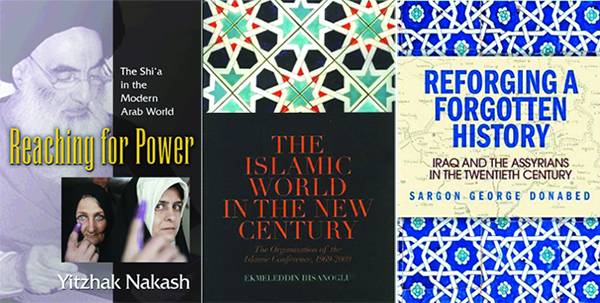
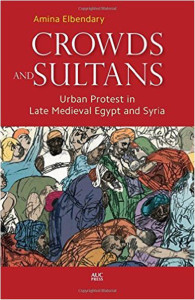
Crowds and Sultans: Urban Protest in Late Medieval Egypt and Syria
Amina Elbendary
The American University in Cairo Press (hardcover), 2016
PRs 5755
During the fifteenth century, the Mamluk sultanate that had ruled Egypt and Syria since 1249-50 faced a series of sustained economic and political challenges to its rule, from the effects of recurrent plagues to changes in international trade routes. Both these challenges and the policies and behaviors of rulers and subjects in response to them left profound impressions on Mamluk state and society, precipitating a degree of social mobility and resulting in new forms of cultural expression. These transformations were also reflected in the frequent reports of protests during this period, and led to a greater diffusion of power and the opening up of spaces for political participation by Mamluk subjects and negotiations of power between ruler and ruled.
Rather than tell the story of this tumultuous century solely from the point of view of the Mamluk dynasty, Crowds and Sultans places the protests within the framework of long-term transformations, arguing for a more nuanced and comprehensive narrative of Mamluk state and society in late medieval Egypt and Syria. Reports of urban protest and the ways in which alliances between different groups in Mamluk society were forged allow us glimpses into how some medieval Arab societies negotiated power, showing that rather than stoically endure autocratic governments, populations often resisted and renegotiated their positions in response to threats to their interests.
This rich and thought-provoking study will appeal to specialists in Mamluk history, Islamic studies, and Arab history, as well as to students and scholars of Middle East politics and government and modern history.
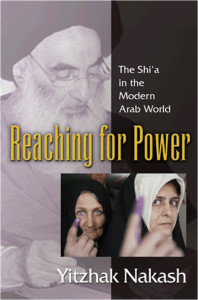
Reaching for Power: The Shi’a in the Modern Arab World
Yitzhak Nakash
Princeton (hardcover), 2007
PRs 2,480
As the world focuses on the conflict in Iraq, the most important political players in that country today are not the Sunni insurgents. Instead, they are Iraq’s Shi’I majority—part of the Middle East’s ninety million Shi’I Muslims who hold the key to the future of the region and the relations between Muslim and Western societies. So contends Yitzhak Nakash, one of the world’s foremost experts on Shi’ism.
With his characteristic verve and style, Nakash traces the role of the Shi’is in the struggle that is raging today among Muslims for the soul of Islam. He shows that in contrast to the growing militancy among Sunni groups since the 1990s, Shi’is have shifted their focus from confrontation to accommodation with the West. Constituting sixty percent of the population of Iraq, they stand squarely at the center of the U.S government’s attempt to remake the Middle East and bring democracy to the region. This groundbreaking book addresses the crucial importance of Shi’is to the U.S. endeavor. Yet it also alerts readers to the strong nationalist sentiments of Shi’is, underscoring the difficult challenge that the United States faces in attempting to impose a new order in the Middle East.
The book provides a comprehensive historical perspective on Shi’ism, beginning with the emergence of the movement during the seventh century, continuing through its rise as a political force since the Iranian Islamic Revolution of 1978-79, and leading up to the Iraqi elections of January 2005. Drawing extensively on Arabic sources, this comparative study highlights the reciprocal influences shaping the political development of Shi’is in Iraq, Saudi Arabia, Bahrain, and Lebanon, as well as the impact of the revival of Shi’ism on the larger Arab world. The narrative concludes with an assessment of the risks and possibilities arising from the assertion of Shi’I power in Iraq and from America’s attempt to play an increasingly forceful role in the Middle East.
A landmark book and a work of remarkable scholarship, Reaching for Power illuminates the Shi’a resurgence amid the shifting geopolitics of the Middle East.
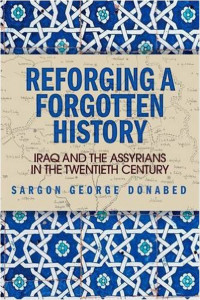
Reforging a Forgotten History: Iraq and the Assyrians in the Twentieth Century
Sargon Donabed
University of Edinburgh (hardcover), 2015
PRs 3,290
Were they simply bystanders, victims of collateral damage who played a passive role in its history? Furthermore, how have they negotiated their position throughout various periods of Iraq’s state-building processes? This book details a narrative of Iraq in the twentieth century and refashions the Assyrian experience as an integral part of Iraq’s broader contemporary historiography. It is the first comprehensive account to contextualize a native experience alongside the emerging state. Using primary and secondary data, this book offers a nuanced exploration of the dynamics that have affected and determined the trajectory of the Assyrians’ experience in twentieth-century Iraq.
About the Author
Sargon George Donabed is Assistant Professor of History at the Department of History and American Studies at Roger Williams University in Bristol, Rhode Island. He is co-editor of The Assyrian Heritage: Threads of Continuity and Influence (Acta Universitatis Upsaliensis, 2012), Religion and theState: Europe and North America in the 17th and 18th centuries (Lexington Books, 2012) and The Assyrians of Eastern Massachusetts (Arcadia Publishing, 2006).
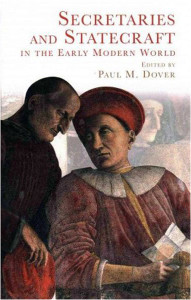
Secretaries and Statecraft in the Early Modern World
Paul M. Dover
University of Edinburgh (hardcover), 2016
PRs 13,155
One of the prominent themes of the political history of the 16th and 17th centuries is the waxing influence officials in the exercise of state power, particularly in international relations, as it became impossible for monarchs to stay on top of the increasingly complex demands of ruling.
Encompassing a variety of cultural and institutional settings, these essays examine how state secretaries, prime ministers and favourites managed diplomatic personnel and the information flows they generated. They explore how these officials balanced domestic matters with external concerns, and service to the monarch and state with personal ambition.
By opening various perspectives on policy-making at the level just below the monarch, this volume offers up rich opportunities for comparative history and a new take on the diplomatic history of the period.
About the Author
Paul Dover is Associate Professor of History at Kennesaw State University. He has published widely on the political, diplomatic and cultural history of late medieval and early modern Europe.
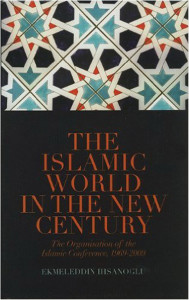
The Islamic World in the New Century: The Organisation of the Islamic Conference
Ekmeleddin Ihsanoglu
Hurst (hardcover), 2010
PRs 7,400
The Organization of the Islamic Conference is the Muslim world’s only intergovernmental body—the largest such system operating outside of the United Nations. Based in Jeddah, Saudi Arabia, the OIC was founded forty years ago to respond to the Palestinian crisis and counts fifty-seven Muslim countries among its members. It has since branched out into economic development, education, culture, science, technology, conflict resolution, and countering Islamophobia. Sharing the history of the OIC with Western readers, this book details the achievements, successes, and failures of a singular political body and why modernization is so central to the development of Islamic society.
In 2005, the OIC elected Ekmeleddin Ihsanoglu of Turkey to transform its platform and intentions. Ihsanoglu has since confronted the difficult problems of illiteracy and poverty, economic underdevelopment, and ethnic and sectarian conflict. In this history he devotes an important chapter to Islamophobia and its impact on relations between Islam and the West. The OIC treats Islamophobia as a form of racism and xenophobia, and Ihsanoglu explains why it is essential for international institutions to work together to combat violent extremism. He also argues that representative government, free speech, and equal rights for all citizens are critical for Muslim societies, and he envisions the need to reform the OIC as a necessary step toward renewing the Muslim world. One of the most important studies of Muslim politics to emerge directly from its participants, The Islamic World in the New Century ushers in an era of change.

